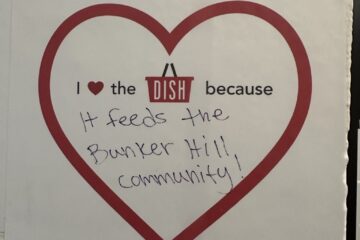Written by Stefano Mancini, Bill Emerson National Hunger Fellow with The Greater Boston Food Bank.
The scale of food insecurity in Massachusetts is staggering. About 1 in 3 public college students in our state are struggling with food insecurity. These numbers seem too big to comprehend – but at Salem State University (SSU), administrative staff who promote student success know, by name, students struggling to stay fueled for classes, and have built strong relationships both on campus and in the community to provide for the basic needs for all Vikings.
Students, faculty, and staff at Salem State care deeply about destigmatizing and combating food insecurity, as evidenced though the University’s longstanding relationship with the Salem Pantry, an agency partner of The Greater Boston Food Bank’s, as well as SSU’s Center for Civic Engagement’s commitment to food insecurity resources for students and active involvement with the MA Hunger-Free Campus Coalition (HFCC).
“At Salem State, student success is a priority, and this is not possible without first making sure our students’ basic needs are met,” notes President John D. Keenan. “Like many other college campuses, we are increasingly seeing food insecurity as a challenge for our students. Although we have offered an on-campus food pantry for several years and have strong community partnerships to provide convenient and reliable access to free healthy food, we know this is not enough. The good work of HFCC will help address this challenge.”
SSU is one of 30 public and minority-serving institutions of higher education in Massachusetts that received funds from the legislature in 2022 through the MA Hunger Free Campus Initiative to ensure that students are fueled and ready to learn. The Massachusetts Hunger-Free Campus Coalition, founded in 2019 and led by The Greater Boston Food Bank, the Food Bank of Western Massachusetts, and the Massachusetts Law Reform Institute, works to advance legislative and budget campaigns to permanently establish and fund the Initiative. Currently, the Coalition is advocating for $2 million in the FY25 state budget for the Initiative (building upon $1M in the FY24 budget and $3.7M through ARPA funding), and to pass an Act establishing the Hunger Free Campus Initiative (S835 / H1293). The legislation is sponsored by State Representative Andy Vargas (D-Haverhill) and SSU’s representative and alumna, State Senator Joan Lovely (D-Salem).
Hunger Free Campus grant recipients use funds in various ways to address the unique needs of their student bodies. SSU uses this funding to ensure that students who stay on campus during breaks, including students at risk of homelessness, can apply to have their break meal plan costs covered. So far, approximately 50 students have been approved for aid through the grant, but the number of students who need to stay on campus and ask for aid is growing every semester. Student co-chair of Salem State’s Hunger-Free Campus Coalition, Emilie, stated, “when young people are struggling with food insecurity, it’s difficult for them to be a strong student, have personal relationships, and care for themselves.”
We know Massachusetts can be a food-secure state. Through resources like the Hunger Free Campus Initiative, Salem State is taking on that challenge to become a campus where no Viking goes hungry.
